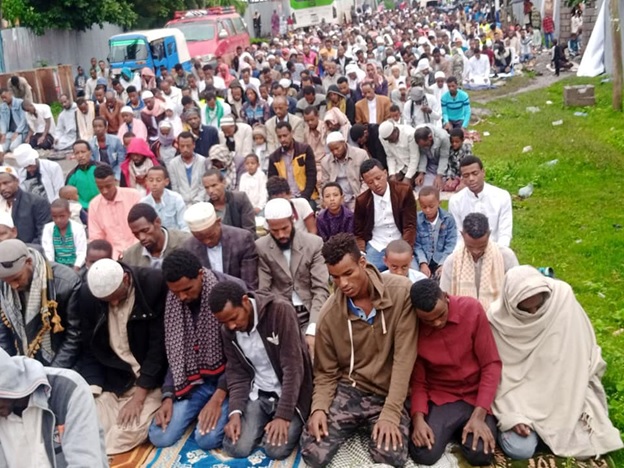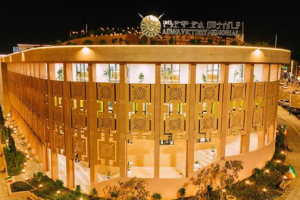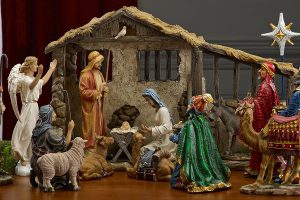
Anwar Ferhu who is hailed from Guraghe ethnic group in Gurage Zone of Southern Nations, Nationalities and Peoples’ State (SNNPs) has been living in the capital for the past five years. But, he never missed the chance to celebrate Eid al-Adha (Arafa) holiday at his birth place, Guraghe.
The Ethiopian Herald approached him last Saturday while he was shopping clothes and other commodities for his family who is living in the rural area of Gurage. He was planning to travel to his family on Monday, eve of the Arafa holiday to join his family.
“I have never celebrated Arafa holiday without my family. Though I live in Addis Ababa, I always travel to my birth town to join my family on the day,” he told The Ethiopian Herald.
According to Anwar, all followers of Islamic religion celebrate the Arafa colorfully through addressing pray, supporting the needy families. He also enjoys the holiday with his families and relatives across the world. He said those who are at a better level of economic status travel to Mecca to commemorate the day at the sacred place. This is done to keep the religious values and practices as well.
The celebration of the holiday in Guraghe and Siltie Zones of SNNPs state is very unique, colorful, he noted. “I am not the only person who enjoy joining families during the Arafa celebration, no one wants to miss the celebration together with his/ her families.”
Every Muslim hailed from Guraghe or Siltie will gather from all corners of the country to join families, Anwar stated. Besides, every family in these areas welcomes their children, families or relatives.
“Earlier the holiday, every guest will join their families. I usually head to Guraghe during the eve. The road to the zone will get crowded since everyone begins journey along with invited guests or beloved ones.
On the eve of the holiday, every household either redecorate or clean their houses and compounds. Men prepare ox or cow and women also undertake cooking special foods such as cabbage, butter, qocho and other delicious traditional foodstuffs, according to Anwar. All the preparations will be completed a day before the Arafa Day and the celebration will also start by carrying out Fetir program or by breaking the fast.
During the Arafa Day, the first activity is gathering of all neighbors in one place for worshiping and praying. And it followed by animal slaughtering ceremony. In the next day, every neighbor visit each other and enjoy eating Kitfo, a traditional Gurage food prepared from meat, as to Anwar.
The third day after Arafa is locally known as Yejeweche. During this day any married women with their husbands and children will visit their parents. The family of women express good will for the marriage their daughters. Grandparents will also meet and bless their grandsons and daughters, he added. And the festival will be concluded with blessing of elders, Anwar stated.
Beyond its religious value, Arafa has an importance in promoting the culture, strengthening the social bonds and togetherness, according to him. “The most things I enjoy during Arafa is that I will meet all my families and friends. It is during Arafa that we can usually meet and celebrate the Day together,” Anwar said.
Gurage Zone Culture, Tourism and Sport Bureau Head Feleke Haile told The Ethiopian Herald that Arafa is colorfully commemorated in Guraghe zone every year. The annual holiday is attended by everyone coming from every corner of the country.
After the conclusion of the Arafa Holiday, everyone promises to attend the next year’s celebration and starts preparation immediately to meet his/her promise. They start saving for the next holiday. Arafa is both a religious holiday and cultural practice as it is being commemorated through worshipping and gathering for traditional activities, according to Feleke.
These practices are habitually applied by Muslims in the area as Meskel (finding of the true cross) celebration is known for attached to Christians in the region simultaneously. Both religious holidays are celebrated colorfully. These holidays are blessings of the area in strengthening social bonds, economic, cultural and tourism developments, he said.
On the Day, one third of the prepared meat (food) will be provided to those in need. In addition, resources will be mobilized from different parts of the country and the world to the development activities in area. Hence, he said, such holidays boost economic and social development of the region. Beyond that, those who live outside of the area provide direct support for infrastructural development in the area, Feleke mentioned.
“As Arafa Holiday comes following the Islamic Pilgrimage, Hajji, it remembers us Ethiopia’s glorious history in receiving the first Muslims before 1,400 years ago,” Ethio-Arab History Researcher, Professor Adem Kamil told The Ethiopian Herald.
According to Professor Adem, Prophet Mohammed standing in Mecca commanded the world “don’t touch Hebesha” and praised Ethiopia as “the land of truth.” “Hence, Arafa holiday remembers us Ethiopia’s role and position in Islamic religion and the words of the Prophet for the country,” he said.
In addition, this holiday also linked to Bilal, the prayer of Ethiopian origin who have special place in Islam. During the day that Allah sends mercy to Prophet Mohammed, the message was disseminated by Bilal for 114 thousand worshippers of the religion. Hence, Ethiopia has especial connection with Islamic religion and the Arafa Holiday remembers us Ethiopia’s role in the expansion and development of Islamic religion, as to Prof. Adem.
He underlined that Islam reached in Ethiopia 7, 18, 21, 27 years before it reached Medina, Syria, Egypt, and Algeria and Morocco respectively. Ethiopia also accepted Islamic religion 36 years before Sudan, 76 years before Turkey and Iran and 170 years before India and Pakistan, he mentioned.
“While gathering in one place for worshiping and praying for mercy from Allah during Arafa, we are remembering this history of the strong bond between Ethiopia and Islamic religion,” the Researcher stated.
This year’s Arafa holiday in Ethiopia is also something special as the country is celebrating the successful and peaceful national election and second phase filling of the Grand Ethiopian Renaissance Dam (GERD), Prof. Adem noted.
For him, the holiday is a praying and worshiping day for Muslims to thank Allah and for mercy. The holiday preaches peace, love, harmony, patriotism and generosity. It promotes unity, togetherness and supporting the needy, which are the basic pillars of Islamic religion and these pillars are very helpful for patriotism and nation building process.
“Strengthening family relations is among the key principles of Islam and the special celebration of the holiday in Gurage and Siltie is a kind of this value, Professor Adem said with regard to the special celebration of Arafa in Gurage and Siltie Zones of SNNPs.
“The religion commands everyone to respect, ask and visit parents and families to strengthen their social bond. Allah said that those who visit their family and respect his commandment will receive his compassion.” Hence, the people of Siltie and Gurage’s activities of joining their family during the Arafa holiday comes from the principles of the religion with due respect of the commands of Allah, he added.
Beyond strengthening the religion, in the area, the holiday strengthens the people-to-people relations and brings social and economic developments to the area.
BY DARGIE KAHSAY
The Ethiopian Herald 22 July 2021





